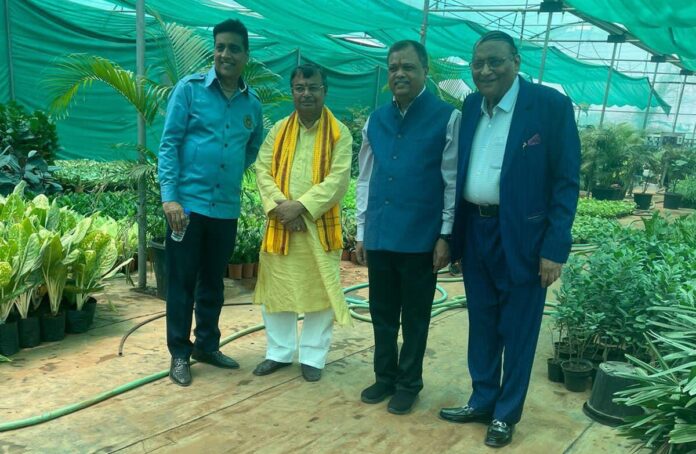Tripura’s Agriculture and Farmers’ Welfare Minister, Ratan Lal Nath, embarked on a visit to a nursery in New Delhi on Friday to witness the utilization of cutting-edge technology in enhancing the yield of flowers, fruits, and vegetables. The minister’s objective was to observe how advanced techniques such as tissue culture contribute to the production of improved seedlings, ultimately bringing smiles to the faces of farmers by increasing agricultural yields.
Accompanied by Manoj Kumar, the Special Residential Commissioner of Tripura Bhavan in Delhi, Minister Ratan Lal Nath engaged in discussions with nursery workers and agricultural experts. The visit aimed to gain insights into the nursery’s seedling planting methods and advanced agricultural practices. Inspired by the nursery’s success, the minister extended an invitation to the officials to visit Tripura and share their expertise in implementing modern farming techniques. He expressed his desire to introduce modernity not only to the plains’ fields but also to the traditional ‘jhum’ farming method practiced in the hills of Tripura, emphasizing the need for collaboration with agricultural experts from more developed states.
During the discussions held in New Delhi, Minister Nath highlighted the importance of achieving better yields in the agricultural sector for the benefit of farmers. He also expressed the state’s interest in promoting organic farming practices. Additionally, the minister engaged in conversations with agriculturists on strategies to convert uncultivated land into arable land, thereby expanding the agricultural potential of Tripura.
The minister’s visit to the nursery underscores the Tripura government’s commitment to exploring innovative techniques and adopting modern technologies in the agricultural sector. By witnessing firsthand the application of cutting-edge technology in enhancing yield and productivity, Minister Ratan Lal Nath aims to introduce similar practices in Tripura, with the ultimate goal of improving the livelihoods of farmers and increasing agricultural output.
The use of tissue culture, a laboratory-based propagation method, has revolutionized the production of improved seedlings. By carefully selecting and culturing plant tissues, disease-free and high-yielding seedlings can be developed, offering numerous benefits to farmers. This technology enables the production of uniform and genetically superior plant material, enhancing crop quality and quantity. The minister’s interest in incorporating tissue culture techniques in Tripura’s agricultural practices demonstrates his vision for sustainable growth and improved farm productivity.
Furthermore, Minister Ratan Lal Nath’s intention to modernize the traditional ‘jhum’ farming method highlights the need to strike a balance between preserving indigenous agricultural practices and embracing modern agricultural advancements. ‘Jhum’ cultivation, also known as shifting cultivation, has been a traditional practice in the hills of Tripura for generations. However, factors such as population growth, land scarcity, and environmental concerns necessitate the exploration of alternative farming methods. The minister’s aspiration to seek guidance from agricultural experts and introduce modern techniques within the context of ‘jhum’ farming reflects a forward-thinking approach that aims to address these challenges while respecting the local farming traditions.
The emphasis on organic farming aligns with the growing global demand for organic produce and sustainable agricultural practices. Organic farming promotes the use of natural fertilizers, biological pest control, and the maintenance of soil health, minimizing the environmental impact of conventional farming practices. By focusing on organic farming, Tripura has the potential to tap into lucrative markets and contribute to sustainable development.
The conversion of uncultivated land into arable land is a critical endeavor that can significantly expand Tripura’s agricultural capabilities. Through careful land management, soil reclamation, and the implementation of appropriate farming techniques, barren or underutilized land can be transformed into productive agricultural areas. This initiative holds immense potential for increasing the agricultural output of the




